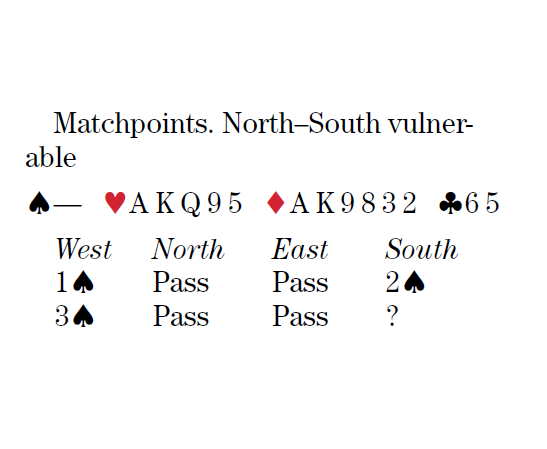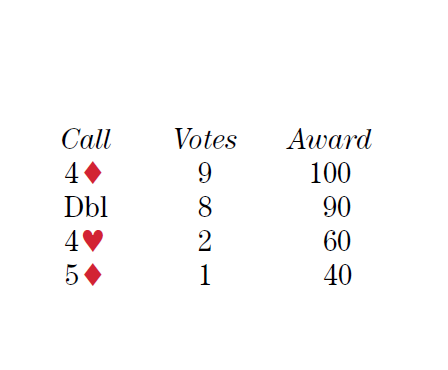
What’s your call?
| 3NT | ||||
| 4♣ | 4♦ | 4♥ | 4♠ | 4NT |
| 5♣ | 5♦ | 5♥ | 5♠ | 5NT |
| 6♣ | 6♦ | 6♥ | 6♠ | 6NT |
| 7♣ | 7♦ | 7♥ | 7♠ | 7NT |
| Dbl | Pass |
Red-handed monster
Stack prefaces his 4♦ by saying, “I’m not sure we are bidding enough. But to take this hand to the four level without input from partner must show great playing strength.”
“We might be a tad heavy for 4♦,” say the Joyces, “but what a silly auction 5♦–Pass–5♥ would be!”
“4♦,” announces Cohen. “A slight underbid. If I were to double, how would partner know that ♣Q J 10 x is good for defending, but ♦Q J 10 x means he should pull? Same problem with 5♦: If I catch nothing in diamonds, we can’t turn back.”
Sanborn, too: “It’s worth the risk of playing here in order not to bypass 4♥. Even if partner passes, it could be right.”
The Gordons believe their 4♦ is forcing. “The initial cuebid should show a strong two-suiter (we would double with three suits and bid 3♠ with one suit).”
Falk bids 4♦ and offers this analysis: “LHO’s bidding suggests the red suits may not be breaking, so unless partner has a trick for me, this is as much as I can bid. I am not considering a double — if partner had a spade stack, he’d have doubled already. I’ve got an extra diamond rather than an extra high card, especially for defensive purposes.”
Lawrence, on the other hand, elects to double. “Takeout. If partner bids 4♣, I can still bid 4♦, which shows this hand. If he bids 5♣, unexpected, I will bid 5♦ and wonder if I should not be bidding more. While a sane choice, 4♦ gives up getting a penalty against 3♠.”
“Double.” Rigal invites partner’s participation. “Showing extras and some defense. Let’s ask partner rather than telling him what to do.”
Colchamiro vacillates between 4♦ and double, and eventually places the red card on the table. “One of the worst moments in bridge is when you bid in these situations and partner puts down ♠Q 10 9 x x, smugly giving you the sarcastic ‘Good luck partner.’”
“Double — definitely takeout,” announce the Sutherlins. “We have shown 10-plus cards in two suits and we are still below game. Guessing whether to bid 4♦ or 5♦ takes hearts out of play.”
Boehm doubles. “After correcting 4♣ to 4♦ and pinpointing my suits, I hope to imply great high-card strength, enough to sustain partner’s possible penalty pass.”
Weinstein bids 4♥. “Matchpoints is a twisted game. Though we have the right values for double, we’re too concentrated. Also, partner already had a chance to double 3♠. 4♦ looks normal, but oddly, when partner has better diamonds than hearts, we’ll often get a better score in hearts. Furthermore, our distortion might provoke the opponents into taking a phantom save.”
Robinson bids 4♥, too. “Partner shouldn’t pass with a singleton heart. I don’t want to double and have partner pass it because he didn’t have anything clear to bid. 4♥ will play opposite a doubleton.”

